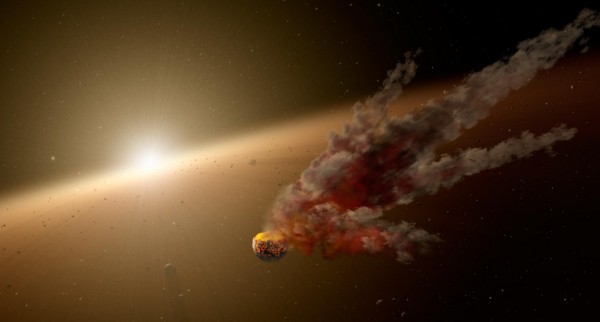By Ana Verayo, | February 15, 2016

Russian scientists are now developing new missiles to target a passing asteroid in 2036.
Russian scientists are now carrying out plans to develop new nuclear missiles to target dangerous meteors and asteroids that can potentially crash into Earth. Local media reports say that scientists are now working on improving their ICBMs (InterContinental Ballistic Missiles) that aim to target near Earth objects and space debris re-entering the planet's atmosphere.
Like Us on Facebook
According to lead researcher Sabit Saitgarayev of the Makeyev Rocket Design Bureau, these projectiles will be aimed at meteorites the size of 20 to 50 meters in diameter. Meteorites originate from an orbiting asteroid near the sun, as debris fall off from this cosmic object, surviving re-entry into the planet's atmosphere and then landing on the surface of Earth.
Scientists are now planning to test their missiles on their chosen target, the asteroid 99942 Apophis, that will pass dangerously close to the planet in 2036, says Saitgarayev . There has been a general consensus regarding this unusually close encounter, as NASA already ruled out the possibility of a catastrophic impact.
The chief scientist explains the mechanism behind how missiles can obliterate space objects like meteorites and asteroids. Saitgarayev reveals that since most rockets work on boiling fuel, these cannot destroy meteorites since fueling occurs 10 days before the launch. Meteorites as big as the one that hit Chelyabinsk a few years ago, has been detected several hours prior to impact, which is the main reason why intercontinental ballistic missiles need to be upgraded.
Saitgarayev also says that in order to modify current solid fuel Russian ICBMs, it will cost around several million dollars for this technology that will also go through a myriad of permissions from the government since missiles are considered as weapons of war, posing as a threat to security.
To date, it is still unclear if this missile project will finally get the go signal however, the team has already been working on initial research.
The team is under the Makeyev Design Bureau which has been in operations since 1947. The private company has been developing long rockets such as the OKB-1 (Experimental Design Bureau) that was developed by pioneer rocket engineer and spacecraft designer Sergie Korolev. Russia launched the first man made satellite known as the Sputnik 1 in 1957 that was led by Korolev, placing the first man in space in 1961. Now, the company has been developing rockets to launch Russian satellites into lower Earth orbit.
-
Use of Coronavirus Pandemic Drones Raises Privacy Concerns: Drones Spread Fear, Local Officials Say

-
Coronavirus Hampers The Delivery Of Lockheed Martin F-35 Stealth Fighters For 2020

-
Instagram Speeds Up Plans to Add Account Memorialization Feature Due to COVID-19 Deaths

-
NASA: Perseverance Plans to Bring 'Mars Rock' to Earth in 2031

-
600 Dead And 3,000 In The Hospital as Iranians Believed Drinking High-Concentrations of Alcohol Can Cure The Coronavirus

-
600 Dead And 3,000 In The Hospital as Iranians Believed Drinking High-Concentrations of Alcohol Can Cure The Coronavirus

-
COVID-19: Doctors, Nurses Use Virtual Reality to Learn New Skills in Treating Coronavirus Patients







